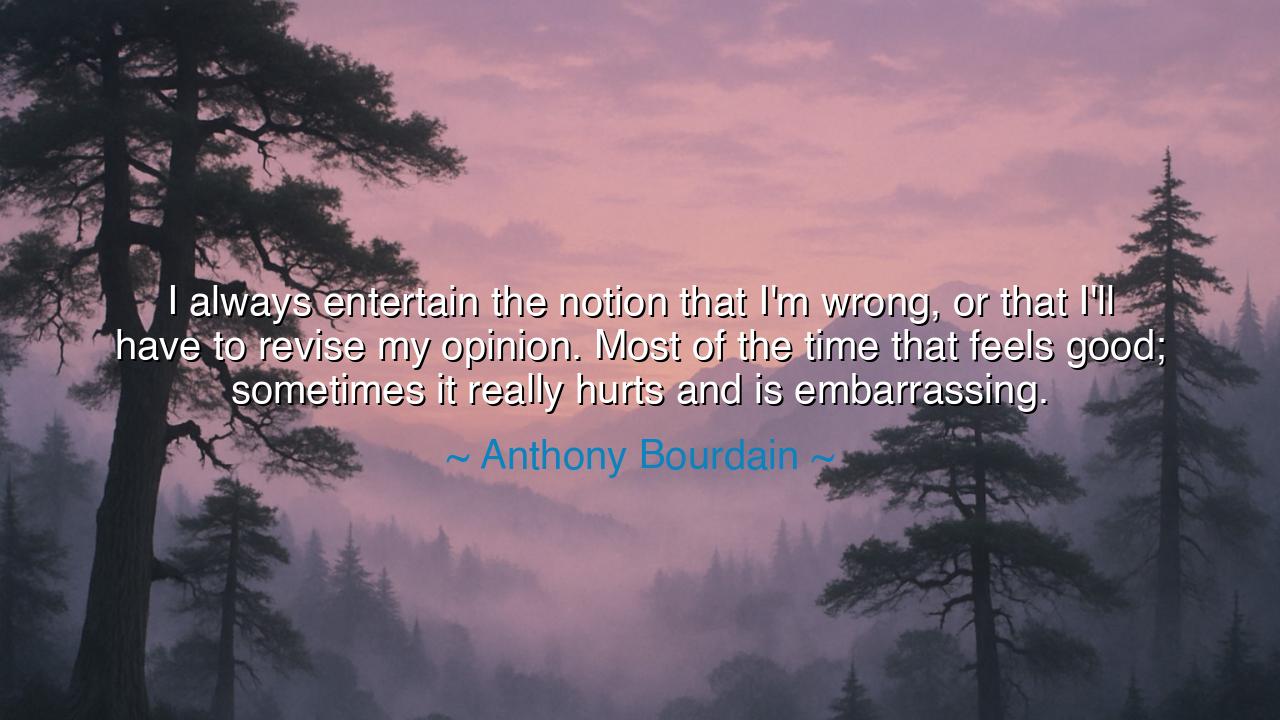
I always entertain the notion that I'm wrong, or that I'll have
I always entertain the notion that I'm wrong, or that I'll have to revise my opinion. Most of the time that feels good; sometimes it really hurts and is embarrassing.






The words of Anthony Bourdain—“I always entertain the notion that I’m wrong, or that I’ll have to revise my opinion. Most of the time that feels good; sometimes it really hurts and is embarrassing.”—speak with the honesty of a man who lived among cultures, kitchens, and contradictions. They reveal a wisdom too rare in our age: the courage to doubt oneself, to admit the possibility of error, to embrace humility even when pride demands otherwise. For to live without self-questioning is to live blind; but to live as Bourdain describes, entertaining the possibility of being wrong, is to live awake.
The ancients would have honored such humility. Socrates, the philosopher of Athens, proclaimed that the only wisdom he possessed was in knowing that he knew nothing. His greatness lay not in claiming certainty, but in revising opinions in the light of truth. Bourdain, like Socrates, walked among the people—chefs, travelers, strangers in distant lands—and found that wisdom was not in clinging to what he thought he knew, but in allowing experience to change him. To revise one’s opinion is not weakness; it is strength, for it means that truth matters more than ego.
And yet, as he admits, this practice is not without pain. To discover that one has been wrong is to feel the sting of pride wounded, to endure the sharp heat of embarrassment. But even this pain is a teacher. It breaks the hardness of arrogance, softens the spirit, and allows growth. Without that hurt, without that humiliation, the heart remains brittle and blind. Bourdain reminds us that truth is not always comfortable, but it is always worthy.
History offers us powerful examples. Consider Abraham Lincoln, who during his presidency often faced criticism for changing his mind. Early in his career, he opposed immediate abolition, fearing it would fracture the Union. Yet as war deepened, as he listened to voices of conscience and witnessed the reality of slavery, he revised his position and issued the Emancipation Proclamation. Many called him inconsistent, yet his willingness to change led to one of the greatest moral victories of history. Here we see Bourdain’s wisdom embodied: revising opinion, even when painful, may lead to justice and truth.
Beloved listener, the meaning is clear: do not cling too tightly to your opinions, for they are but vessels that carry you toward truth, and sometimes those vessels must be set aside. To admit you are wrong is not to lose, but to gain. It is to step closer to wisdom, to growth, to authenticity. Only the arrogant remain unbending, and like brittle wood, they break. The humble bend, adapt, and endure.
The lesson for our lives is both simple and difficult: cultivate the habit of questioning yourself. When new evidence, new voices, or new experiences confront you, dare to reconsider. Do not fear the sting of embarrassment, for it will fade, but the wisdom you gain will endure. As Bourdain teaches, most of the time it feels good—because change frees the soul from stagnation. And when it hurts, when it shames, let even that pain become the fire that purifies you.
Practical wisdom is this: listen more than you speak, seek out perspectives beyond your own, and never assume your first opinion is final. Write your beliefs in sand, not stone, so that when the tides of truth arrive, they may reshape them. In doing so, you honor the path of growth and avoid the prison of pride.
So let Bourdain’s words guide you across the years: entertain the notion that you are wrong. Do it with courage, with humility, and with openness. For in this practice lies not only wisdom, but freedom—the freedom to learn, to grow, and to live a life shaped by truth rather than by fear of being mistaken.






AAdministratorAdministrator
Welcome, honored guests. Please leave a comment, we will respond soon